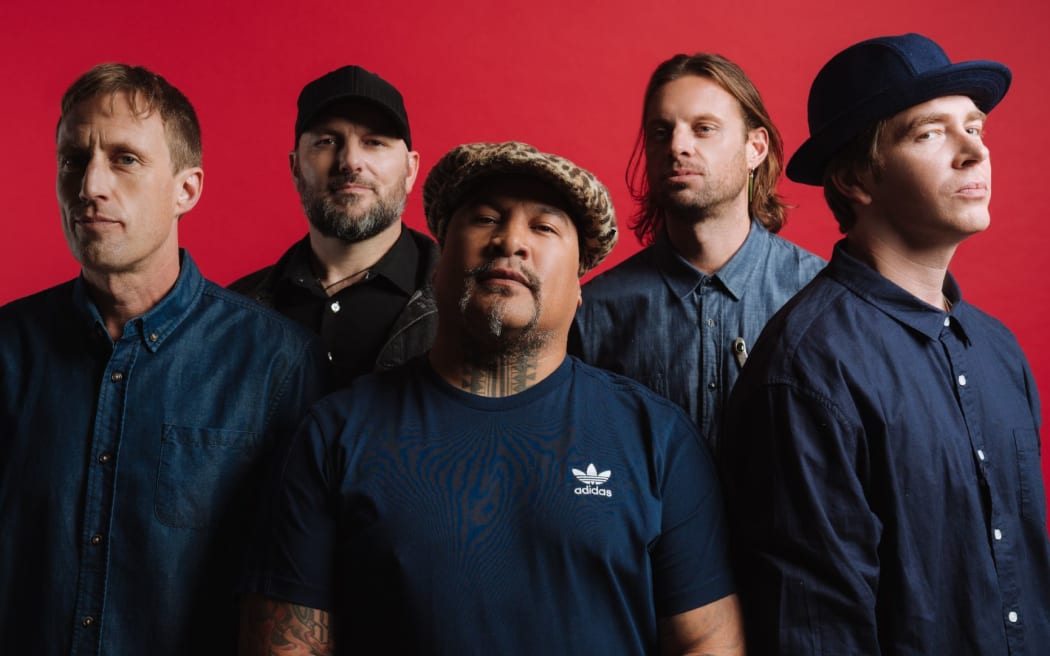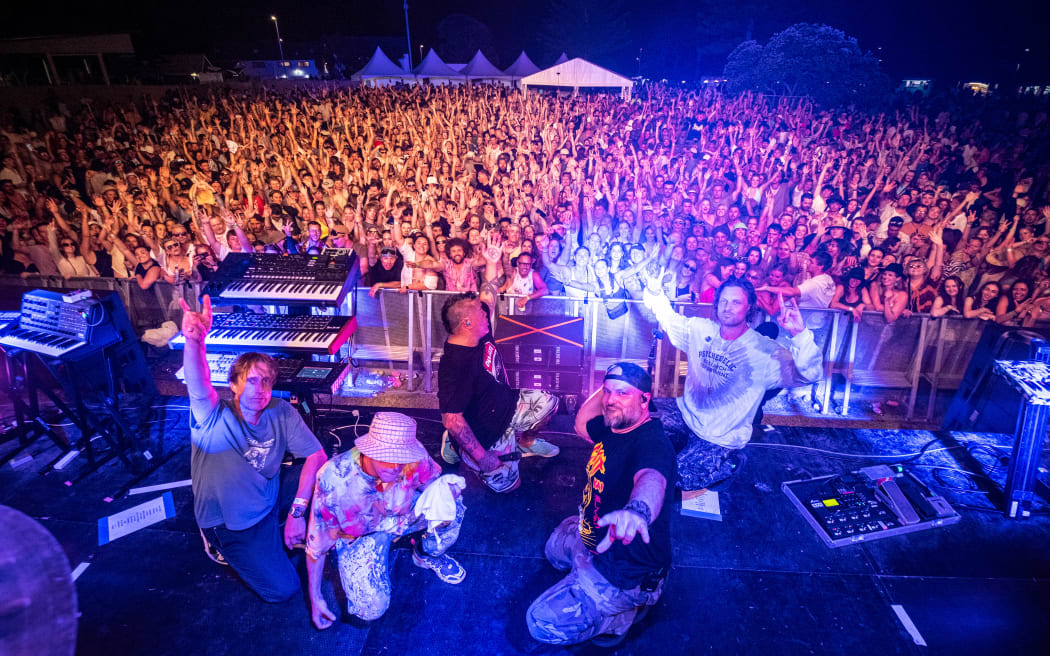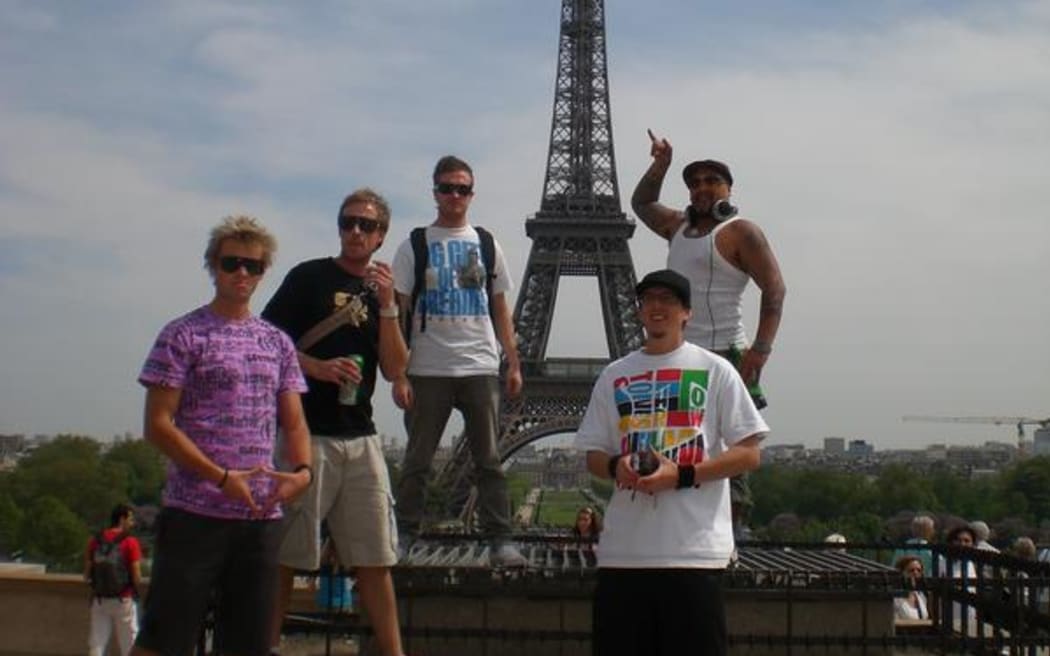
The New Zealand band Shapeshifter (Left to right Nick Robinson , Darren Mathiassen, PDigsss, Nick Robinson Sam Trevethick and Dan McGruer) Photo: Supplied
It is a "real honour" to still be performing for fans 25 years on, Shapeshifter founding member Sam Trevethick says.
The trailblazing live drum and bass band formed in Christchurch back in 1999 and is celebrating a quarter-century of performing around the world.
Trevethick and fellow founding member Nick Robinson talked to Music 101's Charlotte Ryan - a "very early fan" and the band's former manager - about the highs and lows.
The original members of Shapeshifter were at Christchurch's jazz school in the late '90s when they bonded over a shared love of drum and bass.
The genre was "massive" at that time, Robinson says, with people lining up around the street to hear UK drum and bass DJs at the night club Ministry.
In the early days, Shapeshifter had an old synthesizer "so fat it would just rattle the old jazz school walls", he says.
Drum-and-bass is "more scientific" than rock or electronic dance music, Trevethick says, and Shapeshifter's point of difference was the presence of a live drummer - at that time Redford Grenell.
"We improvised a lot in the first years of the band. We'd just have a bassline drop and maybe a sample and some chords and that would be the makeup of the song. We'd roughly know how it went and then we'd see how it goes [on stage] … If people were really feeling it then we would elevate and keep going. If we needed to break it down then we would.
"When you're in that situation, the whole place comes together in a kind of synergy that's electric. Nothing's predetermined. It's a subconscious connection that you don't get from DJing as much or from playing pre-recorded music.
"[A live sound] was our intention and it is still. We don't sequence things. we still try and make it as live as possible."
Shapeshifter was not really accepted by the drum and bass "establishment", Trevethick says.
"I remember turning up to places all over the world and going 'You might not have heard anything like this before - check out our drummer'. Just knowing that we had something, something unique. We believed in it. We didn't ever regret it but we definitely felt frustrated sometimes that we weren't accepted into the fraternity of drum and bass."
Grenell was like a "human drum machine but better", Robinson says.
"He could just play any sort of drum and bass break … and he could play it with even more swagger than any other time you'd heard it."

Shapeshifter performing in Whangamatā in 2024 Photo: Mark Russell / Renegade Peach
In the first few years of the band, pre-internet, Shapeshifter had a very limited palette of samples to work with, Trevethick says.
"You'd sit there day after day going through all your sounds, you know, your 100 sounds or whatever and going 'What can I do with that?' 'Oh, that's inspiring'…
"Now you can use a voice prompt in AI to go 'I want an '80s-sounding synth' and boom - you'll have one at your fingertips."
Compared to DJs and fully electronic dance music acts, Shapeshifter had to lug around a lot of heavy gear in the early days, Robinson says.
At Serbia's EXIT Festival, the band shared the bill with the American DJ Skrillex.
"That guy's just cruising the world with a USB stick, and we've got drum cases and old cases with belts around them to keep them together … There was definitely like moments where you're like 'Well, we're doing it the hard way, for sure'."
Headlining the electronic stage at Glastonbury was a massive highlight for Shapeshifter, Trevethick says, but so was playing sets in the Big Day Out's Boiler Room.
"Coming from Christchurch, Auckland was the bigger centre. We always felt like... not underdogs but you know. The industry is very much based in Auckland and we were kind of battling a little bit.
"Ending up on the Boiler Room stage with the crowd just going absolutely mental is a very fond memory. It was still quite early in our career as well so we were just absolutely fizzing."
Looking back, Robinson remembers feels a real sense of connection with people that were around in the band's earlier years.
Not everyone followed Shapeshifter's evolving sound, he says, but the musicians had worked hard not to repeat themselves.
"Each album we fought ourselves to not say to ourselves 'What was the formula last time? Let's do that again.'
A lot of great bands push themselves towards reinvention, Robinson says, losing fans and gaining fans in the process.
"We did [hit 2006 album] Soulstice. It's done. It's never going anywhere. People can always enjoy it for what it is. Let's do something different."
Listening back to some of their earlier music, there is an element of "ooh, we wouldn't do that now", he says.
"But there were also other elements of 'Wow, we were brave and that's cool' and getting almost inspired by our younger selves or different selves at that time. So there's a bit of inspiration there as well."

Members of the NZ band Shapeshifter at the Eiffel Tower Photo: Supplied
Trevethick says he feels very, very lucky that Shapeshifter still has a keen audience.
"We're very grateful for that and don't take it for granted. It's an honour really to step into a mode of creation and think 'man, we've got to do our best work'. That's a real honour."
He and Robinson live near each other now and are both parents.
While the passion and energy are still there, free time is another story, Trevethick says.
"With Soulstice, we went to Kaikōura and spent six months just eating crayfish and making basslines and dreaming, same with The System is a Vampire [2009]. But that's not going to happen again."
Robinson feels "energised" for another 25 years of Shapeshifter.
"It's only when you kind of walk past the mirror or remember your age that you kind of like 'Oh shit. That's right. I forgot'."
One of the things he is most proud of is that some of the original band members have stuck it out together.
"We're still you know, brothers. We love working together. I still get excited when we're about to go into the studio together. So yeah, I think it's a great accomplishment."
Over the years, he's developed "massive trust" in his Shapeshifter bandmates.
"With [2013 single] 'In Colour' I thought 'This does not suit the album. This is a weird song on the album and I don't think it should be there'. The other guys thought 'Nah it should definitely be there'. So I'm glad I didn't get my way on that one. I like the song now."
Trevethick admits that learning to really listen to his bandmates' ideas was a slow process for him.
His advice to aspiring musicians is to try and put aside their own passionate feelings about what has to happen.
"I wanted to control a lot and that's why I ended up in the producer's chair pretty early on because it was a way to express myself and I kind of had control.
"It took me a few years to realise that I needed to listen more, and that was a source of tension. The rest of the band did really really well, I think, in putting up with that."
"More hands on the wheel" tends to result in a better product, Trevethick says.
"Like any relationship, just try and listen. If you don't get your own way it's not gonna all fall down. And don't quit the band."
To celebrate 25 years, Shapeshifter has re-released all of its previous albums on vinyl and will play shows around Aotearoa this June.

